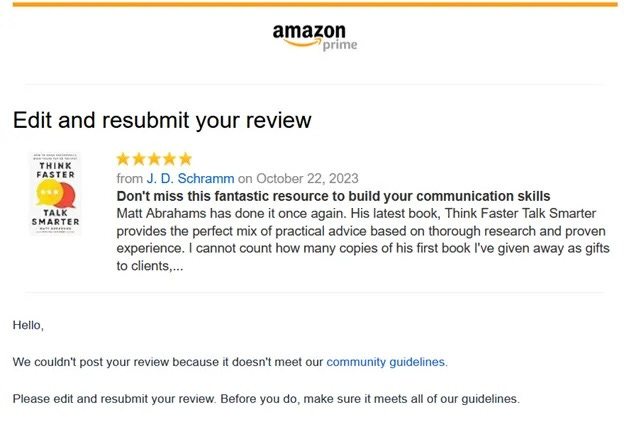Regular readers know how committed I am to acknowledging the fine work of others. So I just could not believe that I had been rejected. Again! This time, I was trying to recommend Matt Abrahams’ book, Think Faster Talk Smarter, and received this email:
It included a link to their 13 Community Guidelines of what was forbidden. I’d seen it all before. In fact, I’d seen it at least a dozen times before. More often than not, when I reviewed a book, it was rejected. I offered no hate speech, profanity, plagiarism, or illegal activities in my posts. I puzzled over, edited, and tried again in my first few rejections. But I continued to be rejected and nearly gave up writing reviews at all.
Then my assistant Jackie took on the challenge to figure out how my compliments might get published and seen. She ultimately broke the code: I was too complimentary of the author. It is a fact that book reviews for the world’s largest bookseller need to be—get this—about the book, not the author. Sure enough, I went back through all my rejections and saw the pattern. I had acknowledged the writer more than the work. Jackie revised my drafts and hit pay dirt. She’s now getting 100% of my reviews approved.
In today’s edition, I will offer communication strategies so that your written compliments and recommendations can have the impact you desire.
Whether for Yelp reviews or recommendation letters for candidates applying for admission to grad school, I believe that you can use these tips to experience greater success.
Strategies when writing reviews or recommendations:
Know the audience and write to their needs. Begin reference letters with “you” or “your,” which forces you to enter the reader's mindset. Consider their needs and write to tie this applicant specifically to their opening. Often, they face a mountain of rec letters, written in boilerplate style. Break through by acknowledging they have a tough job, but can’t miss this candidate.
Know the applicant. I recall being asked if I’d write a reference letter for a former Resident Assistant at an NYU dorm, with whom I’d organized one event a decade earlier. It was for her application to Stanford’s MBA program. I declined. Quite frankly, I did not know her work well enough to be a good writer, and the letter would not have been very strong. If possible, support but don’t replicate the other parts of their application.
Be descriptive. Weave together a narrative about the candidate (or the book) with evidence of the strengths. View your words as if they are the only way for the reader to get to know the applicant.
Write concisely. We all know the adage, “If I’d had more time, I’d have written a shorter letter.” Whether it’s from Mark Twain or Oscar Wilde (or somebody else entirely), it’s true. Writing well takes time. Compelling concision will get read and noticed.
It’s fine to have a format from which you begin, but don’t just provide “boilerplate” feedback on all that you recommend. That will land as hollow and inauthentic.
Above all, write from the heart. Share how that person or book directly affected you. And allow your own humanity to come through in your writing.
Finally, let me offer two shortcuts that have made a huge difference for me and those I’ve reviewed. It takes very little time but has a big impact.
Letters of reference: Excerpt a few sentences from your reference letter and post it to them as a LinkedIn reference for the candidate. This lets your investment of time have a more significant impact, and it underscores that you are “on the record” with your support of this applicant.
Book reviews: Post on GoodReads as well as Amazon. It’s wise to edit your review a bit for the different platforms, but give the writer two compliments for the time it takes to write just one.
From the other side of the equation, here are some guidelines for asking someone to write an academic reference for you (feel free to share with your own kids):
Consider asking for a generic reference at the time of interaction. Then you can ask them to update it for a specific need. At the end of a course I can much more quickly write a reference with vivid details than I can five years later.
Provide all they need to be a great reference for you. Consider sharing your personal statement and essays, if they wish. Send them a link to the exact program to which you are applying.
Be sure they know the deadline. Thank them about 48 hours before the deadline occurs in case they forgot.
Speaking of appreciation, let me offer a shout-out to Giles Burnett, an undergraduate at Emory, where my book is used in all of the Management Communication courses for BBA students. At the end of the term, Professor Molly Epstein invited the students to create a poem about my book and its impact on them. This was a first for me. Representatives from six teams of students shared their thoughts in sonnet form with me. While it was a tight race, Giles’ performance of his team’s experience of my book was both my favorite and the winner of the students’ Choice Award.
And one final shout-out to my assistant, Jackie Utecht. Her keen sleuthing has enabled me to publish a half-dozen book reviews this week alone. Yes, you can also see my recommendation on her own LinkedIn page!
JD’s Recommendations: what I’m reading, hearing, and seeing:
Reading: The folks at Hattaway Communications have done it again, check out How to Create a One-Minute Message About Anything.
Hearing: For a dose of inspiring entrepreneurs, subscribe to The Pitch. Their season 12 finale is a great way to catch up and be ready for the new season in January.
Seeing: and, just like last year, the team at Chevy made me cry with their 2024 Chevy Holiday Commercial: The Sanctuary. Enjoy!
So, as they say in Hollywood, that’s a wrap. Once my USC student’s grades are in, I’m closing up shop for a couple of weeks. I want to invest time with my family and rejuvenate. I also love living a life punctuated by the passing of time. A New Year is a great time to reflect on what worked in the past and what I’m committed to in the future. I hope you take time to do the same. I wish each and every one of you the very best for the year to come.








Interesting. I've never had a review rejected, despite writing glowing missives about the brilliance of the books and music I love. Perhaps it is because I focus on the work rather than the author, as you say. Loved the poem from Molly's student! Giles exudes charisma.
That is so fascinating about why your reviews were rejected. I would never have figured that out. Good work, Jackie! And thanks for sharing.